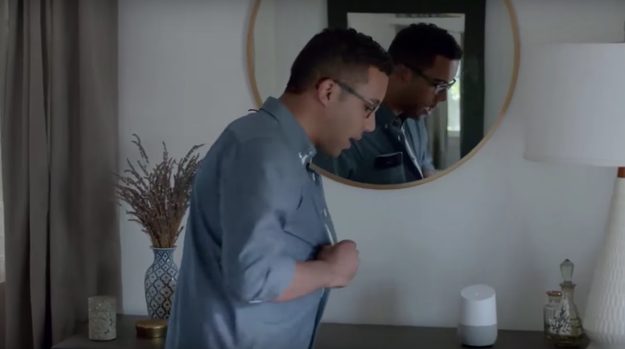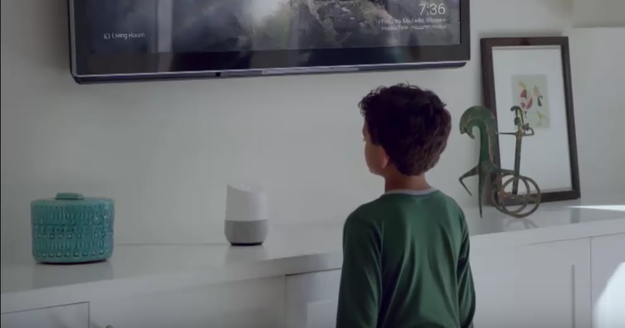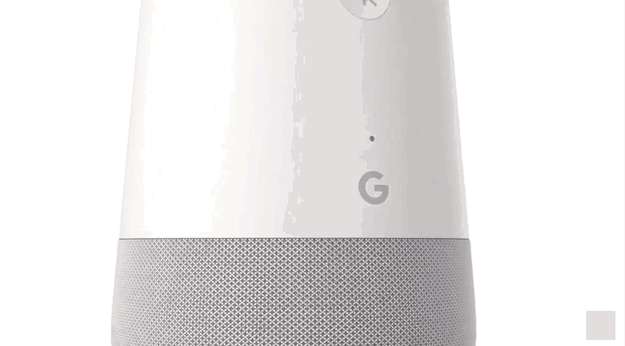
In nondescript building at Google’s Mountain View, California headquarters, Google product VP Rishi Chandra glanced at the small, cylindrical Google Home speaker beside him, and said, “Ok Google, tell me about my day.”
An emotionless female voice gave Chandra a very specific answer: “Good day Rishi,” it said. “It is 3:34 p.m. The weather in Mountain View currently is 73 degrees and sunny, with a high of 77 degrees. Don’t forget your sunglasses. Your flight from San Francisco international airport to San Diego international airport departs at 5:35 PM. It will take 43 minutes to get to the airport with current traffic. Today at 6 PM, your kids have a swimming lesson. By the way, you need to pick up groceries for dinner.”
Hot damn.
Home, which Google will begin selling for $129 in early November, is the company’s answer to the Amazon Echo, a wildly popular ‘smart speaker’ that has reportedly sold over 3 million devices. Like Echo, Home relies on simple voice commands to play music, answer easily-answered questions, set timers and control smart lighting fixtures. And though Amazon has a significant head start in the nascent smart speaker market, Google’s device could give the e-commerce giant a run for its money.

For years, Google “organized” that information by indexing the Web. But following the advent of smartphones, some of that information migrated into apps and services. Google rolled out Google Now in response, digging through the stuff buried in your email or calendar to deliver just in time notifications. It created an intelligent voice assistant to serve as the layer between you and your apps — “okay google, play Drake on Spotify.” Now, with Home, it's attempting to again use voice to become the layer between you and all the devices in your home, and all the information previously captured behind screens.
When the sudden popularity of Amazon&039;s Echo and its Alexa assistant demonstrated there was a market for a small in-home speaker that served as a portal to those services, Google&039;s path became clear. The company had an entire ecosystem of services — search, calendar, streaming music — and in its virtual assistant Google Now (which has since morphed into Google Assistant) an easy way to access them with voice as the primary user interface. Echo — with its quick and easy voice command access to information, music and Amazon&039;s retail experience — was clearly an emerging threat to Google&039;s information-at-your-fingertips ubiquity. But Google, with its array of services and AI acumen, was well-poised to develop a rival device to temper it.
In Google’s office, Chandra showed off a number of neat tricks Home is capable of. He asked it to play happy music, and it played some goofy tunes from YouTube Music. When Chandra told home “play that famous song from Frozen,” the device obliged and played “Let it go.” The latter example showed off one of the cool advantages Google has in this space: artificial intelligence. Google Home can sometimes figure out what we&039;re looking for even if we&039;re only able to provide it with partial information. When I asked the device to play a clip of Conan O’Brien ribbing his employees, it promptly pulled up a YouTube video on on Chandra’s Chromecast showing the TV host crashing a “Conan” show conference room.

Google Home also benefits from a line of productivity products in wide use across the globe. We use Gmail to store our flight details. We use Google Maps to navigate to the airport. Home can tap into all these things. When we ask it about our day, it can tell us when our flight is and when we need to leave to make it. In the future, it could also alert us to flight delays and help to change travel reservations.
Home&039;s power lies in how well it&039;s able to become a new ever-present interface for the ecosystem of Google services many of us already use. If you’re using Google Calendar, Gmail and Maps, Home could become a powerful voice-activated command center for your daily life — assuming you&039;re willing to accept the privacy risks associated with that level of access to your personal information.

Home’s initial release offers basic third party integrations with apps like Pandora and Spotify, but Google eventually plans expand to many more. Which is smart, because — as Amazon has shown us with Echo&039;s voice purchase requests — the business case for these voice-powered assistants is clear. “Once I have this product and it can get me directions, it can also order me flowers and get me a cab and a number of those things are monetizable,” said Google’s Scott Huffman, the engineering lead on Google Assistant.
Google isn’t going to simply bulldoze Amazon in the war to dominate the ‘smart speaker’ market. Amazon currently has over 400 jobs open for positions on its Alexa/Echo team. But this is a key battleground for Google, and if it’s going to keep organizing the world’s information, the company must put its financial and computing weight behind products like Home, or risk seeing a competitor like Amazon run away with its bread and butter.
Quelle: <a href="Google&039;s 9 Smart Speaker Ships In Early November“>BuzzFeed
Published by